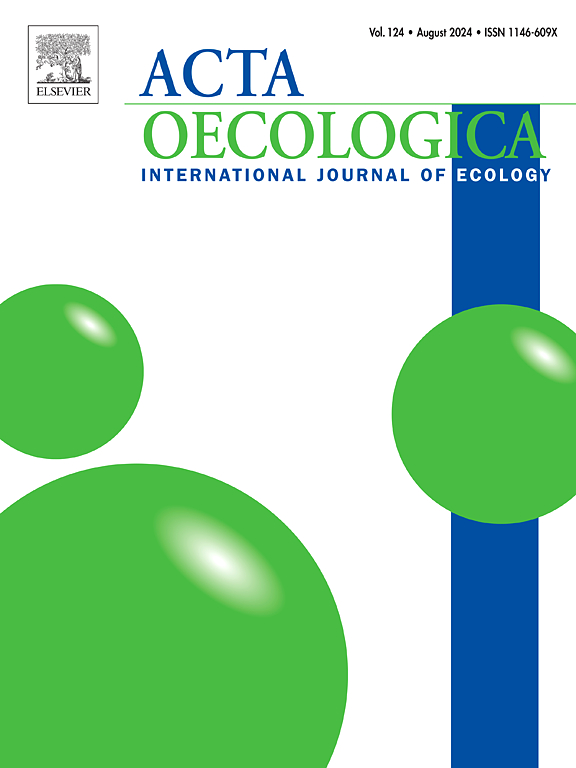城市环境中头Atta对热胁迫的击倒抗性
IF 1.3
4区 环境科学与生态学
Q3 ECOLOGY
Acta Oecologica-International Journal of Ecology
Pub Date : 2025-04-18
DOI:10.1016/j.actao.2025.104076
引用次数: 0
摘要
温度是影响所有生物的主要环境因素之一,影响着生物的生存和繁殖。在城市中,城市化的速度与气温升高有关,并导致城市热岛的产生。在热带地区,城市和农村地区之间的温差可高达12°C,这种条件可能有利于某些昆虫物种的传播,因为它们能够适应高温。在本研究中,我们评估了由于UHI效应而导致温度升高时蚂蚁Atta cephalalotes的可塑性。在哥伦比亚卡利市的两个不同区域(热岛内和热岛外)共收集了8000只蚂蚁。使用环境室测试了五种不同的温度,范围从38°C到42°C,增量为1°C。当蚂蚁停止移动时,击倒被记录下来。采用线性混合模型和混合效应的Cox模型检验在处理温度下的击倒时间和存活概率。虽然在两个区域之间没有发现明显的差异,但本研究首次揭示了A. cephalalotes在任何环境下耐受高温的能力。这代表了这种蚂蚁对热带热岛环境中热应激的高基础耐热性的证据。本文章由计算机程序翻译,如有差异,请以英文原文为准。
Knock-down resistance to heat stress of Atta cephalotes in urban environments
Temperature is one of the main environmental factors affecting all living organisms, impacting survival and reproduction. In cities, the speed of urbanization is associated with an increase in temperatures and leads to the creation of urban heat islands (UHIs). In the tropics, the temperature differential between urban and rural zones can reach up to 12 °C, a condition that might favour the spread of some insect species due to their ability to adapt to high temperatures. In this study, we evaluated the plasticity of the ant Atta cephalotes when the temperature increases due to the UHI effect. A total of 8000 ants were collected from two different zones (inside the UHI and outside the UHI) in the city of Cali, Colombia. Five different temperatures were tested using an environmental chamber, ranging from 38 to 42 °C in 1 °C increments. Knock-down was recorded when ants ceased to move. A linear mixed model and Cox model with mixed effects were used to test the knock-down time and probability of survival at the treatment temperatures. Although no clear differences were found between the two zones, this study reveals for the first time the capacity of A. cephalotes to tolerate high basal temperatures regardless of the environment. This represents evidence of the high basal thermotolerance of this ant species to thermal stress in tropical UHI environments.
求助全文
通过发布文献求助,成功后即可免费获取论文全文。
去求助
来源期刊
CiteScore
3.60
自引率
0.00%
发文量
57
审稿时长
>0 weeks
期刊介绍:
Acta Oecologica is venue for the publication of original research articles in ecology. We encourage studies in all areas of ecology, including ecosystem ecology, community ecology, population ecology, conservation ecology and evolutionary ecology. There is no bias with respect to taxon, biome or geographic area. Both theoretical and empirical papers are welcome, but combinations are particularly sought. Priority is given to papers based on explicitly stated hypotheses. Acta Oecologica also accepts review papers.

 求助内容:
求助内容: 应助结果提醒方式:
应助结果提醒方式:


